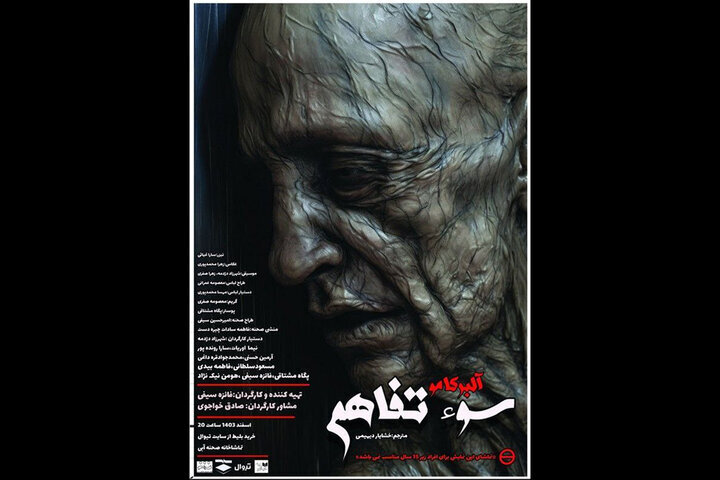Albert Camuss The Misunderstanding on Sahne Abi stage
Albert Camus’s “The Misunderstanding” on Sahne Abi stage
TEHRAN-Albert Camus’s “The Misunderstanding” is being performed at the theater hall of Sahne Abi Cultural and Artistic Center in Tehran.

Faezeh Seyfi has directed the 70-minute play and also performs in it along with Pegah Moshtaghi, Houman Niknezhad, Masoud Soltani, Fatemeh Bidi, and Armin Hasani among others, Mehr reported.
Written in 1943 in occupied France, “The Misunderstanding” focuses on Camus’ idea of “The Absurd”. It is not just a simple play, but the story of the lives of all human beings because the lives of all people are full of misunderstandings.
It is the life story of a man named Jean who returns home after 20 years away from his mother and sister, while he is married and has earned money to leave his mother and sister with. Upon entering the guesthouse run by his mother and sister, he realizes that after all these years, his family did not recognize him at the time of arrival.
Misunderstandings can be more or less reminiscent of aliens. A tragedy that once again reminds us of the loss of opportunity by depicting the death of the family’s son Jean. When he throws himself into an accident and believes in the power of events, it can be said that he kills himself out of jokes and play. So, one can never be a stranger forever and need to find meaning for oneself.
Camus’s play is a return to Greek theater in terms of structure: the dry state of the murder of two women, the deadly chain of crime that leads to another crime, the murder within the family, the unstoppable and unadjustable progress of the first intention, and the theme of recognition.
The three-act play is a tragedy of contemporary man, and the plot of the text, like that of Camus’s other works, is a look at issues related to the philosophy of existentialism, including human freedom, emptiness, and the futility of life. The apprehension of existence and the apprehension of contemporary man, and inevitable situations.
The play is a highly subjective presentation by Camus of the human condition as he saw it in the desperate circumstances of 1942-43. It reflects several aspects of Camus's life: he had left Algeria, to which he was deeply attached, leaving his second wife and friends behind; he was depressed with tuberculosis; as well as living under threat of execution as a propaganda agent of the French Resistance. Camus once described “The Misunderstanding” the play that resembles him the most.
Albert Camus (1913-1960) was a French philosopher, author, dramatist, journalist, world federalist, and political activist. He was the recipient of the 1957 Nobel Prize in Literature at the age of 44, the second-youngest recipient in history after Rudyard Kipling, who was 41. His works include “The Stranger,” “The Plague,” “The Myth of Sisyphus,” “The Fall” and “The Rebel”.
Philosophically, Camus's views contributed to the rise of the philosophy known as absurdism. Some consider Camus's work to show him to be an existentialist, even though he himself firmly rejected the term throughout his lifetime.
Camus's novels and philosophical essays are still influential. He is remembered for his skeptical humanism and his support for political tolerance, dialogue, and civil rights.
“The Misunderstanding” will remain on stage through March 4 at the Sahne Abi Center located at No. 1595, Valiasr St., after Taleqani junction.
SS/SAB
source: tehrantimes.com